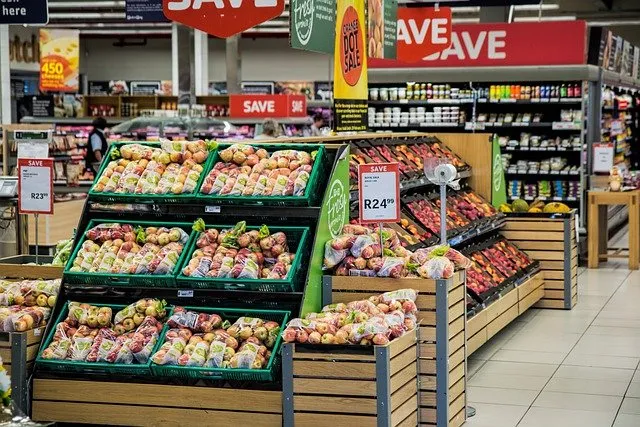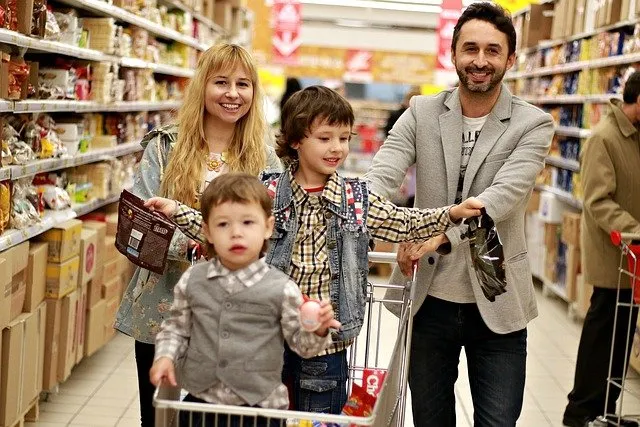Saludos para todos en esta gran comunidad de Motherhood. Hoy comparto con ustedes una información con un tema que espero puedan disfrutar mucho.

Quizás una de las primeras cosas en la que los niños empiezan a experimentar un grado de compromiso y responsabilidad hacia sus padres, es cuando ellos colaboran y brindan el apoyo al participar en algo tan cotidiano en todas las familias como lo es hacer las compras en la bodega. Por ejemplo, aquí en Venezuela coloquialmente se conoce como “Hacer el mandado”. ¿Sabes de alguna otra expresión para referirse a este tema?
Al pensar en esto, probablemente lo primero que puede pasar por la mente de una madre o un padre es: “¿Ya estará mi hijo preparado para esto?” Y es normal, pues son muchos factores los que hay que tener en cuenta a la hora de asignar esta diligencia en el niño. Para esto no hay una edad o momento determinado, y ya que cada niño es diferente a otro en cuanto a desarrollo y crecimiento, serán los mismos padres quienes determinarán la ocasión oportuna para sus hijos.
Yo soy de lo que piensan que “el ejemplo mueve más que las palabras” así que algo que pueden aplicar los padres es ir a la tienda o bodega con los niños para que de esta forma ellos vayan entendiendo todo lo que implica está actividad. También es bueno hacerles preguntas para que ellos se sientan libres de hablar y expresarse ante cualquier duda.
Son muchas las cosas que se deben considerar antes de mandar al niño a la bodega: la distancia desde la casa hasta el establecimiento, si hay que cruzar algún puente, calles o avenidas, la concurrencia del lugar y la hora en la que vamos a enviarlo. Pensar en esto de antemano permitirá a los padres identificar el momento preciso para que el niño pueda hacer el mandado con total éxito.

Otra de las cosas que se deben tener en cuenta es la cantidad de dinero con la que vamos a enviar al niño. No queremos que sea algo que puedan extraviar con facilidad o que los ponga en algún tipo de riesgo. Gracias a los avances tecnológicos, en muchas ocasiones no es necesario que el niño deba portar tanto dinero en efectivo y esto se convierte en un alivio para todos. También es bueno que la cantidad de artículos por comprar sea acorde a lo que los niños puedan cargar sin un esfuerzo máximo.
Yo realmente no recuerdo a qué edad me enviaron por primera vez a la bodega, pero recuerdo perfectamente lo que me ocurrió en una ocasión. Me mandaron con un billete de alta denominación a comprar unas cosas, pero la bodega a dónde fui tenía el mostrador algo alto para mí, así que en un instante puse el billete sobre el mostrador y cuando quise tomarlo nuevamente, ya no estaba. Alguien lo había agarrado. Ante esto me gané un buen regaño, pero también aprendí a tener más cuidado y saber tratar directamente con el encargado del negocio.
Algunos padres con varios hijos suelen enviarlos juntos para la bodega para que de esta forma no estén solos sino que se acompañen mutuamente y esto en muchos casos es positivo, siempre estando pendientes para que esto no sea un blanco de distracción para ellos. Por ejemplo, a mi mamá no le resultaba mucho mandar a mis dos hermanos juntos a la bodega porque siempre traían un cuento diferente, compraban lo que no era, se les perdía parte del dinero o compraban chuchería sin el permiso de ella. Aún así, mi mamá nunca desistió de disciplinarlos y enseñarles hasta que tomaron esa actividad con más responsabilidad.
Siempre habrá ese día en el que quizás el niño no quiera o no tenga las ganas de ir a la bodega, así que es tarea para los padres el saber darles el enfoque correcto a esta situación. Que los niños vean que no se trata de un trabajo o un castigo impuesto, sino de una oportunidad para ayudar y aportar algo valioso para toda la familia. Nunca hay que dejar de felicitarlos así sean varias veces las que vayan a la bodega en un mismo día.

Meditar en esto y en muchas cosas más naturalmente puede generarnos está pregunta: “¿Es seguro mandar a mi hijo a hacer esta diligencia?” y vaya cuán importante es esto, pues las cosas en la calle no son nada segura ni siquiera para los adultos mismos. Por eso, una buena orientación y educación hacia los niños los irá preparando en una actividad que en algún momento ellos deberán asumir.
Al participar en esta actividad, los beneficios son bastantes. Los niños empiezan a adquirir responsabilidad, compromiso mientras se sienten tomados en cuenta para ayudar en las diligencias caseras. También les permite socializar de a poco y ver cómo se desenvuelve todo en un ambiente tan común y normal que será parte de su vida estén dónde estén. Incluso hay niños que se hacen hábiles para las cuentas y los precios y más si hay un incentivo de por medio, como el hecho de comprar alguna golosina con el dinero que quede de la compra. Cómo dicen algunos pequeños por mi sector, “el vuelto es mío”.
La obediencia y la diligencia también serán un campo en el cual los niños podrán cultivar y así poder responder a la confianza de sus padres a la hora de mandarlos a comprar al negocio más cercano. Hasta se puede fomentar aún más la interacción de los pequeños con las personas y las normas del buen hablante y del buen oyente así como las normas de saludo y cortesía hacia los demás, así como recordando el respeto y la prudencia que se debe tener hacia los extraños.
Encomio a todos los niños que ayudan y apoyan en esta actividad, pues esto también redunda en satisfacción gracias a la buena formación y educación que reciben de sus padres. Nunca dejen de enseñarles a sus hijos a ser y crecer como mejores personas cada día, y que cada actividad que hacen es tan importante como el amor y el afecto que sus padres siempre les podrán brindar.

Gracias por darle valor a esta publicación con tu tiempo y atención.
Hasta pronto.
Greetings to everyone in this great Motherhood community. Today I share with you some information with a theme that I hope you can enjoy a lot.

Perhaps one of the first things in which children begin to experience a degree of commitment and responsibility to their parents, is when they collaborate and provide support by participating in something as everyday in every family as shopping at the grocery store. For example, here in Venezuela it is colloquially known as "Running errands". Do you know of any other expression to refer to this topic?
When thinking about this, probably the first thing that may go through the mind of a mother or father is: "Will my child be ready for this?" And it is normal, because there are many factors that must be taken into account when assigning this diligence in the child. For this there is no certain age or time, and since each child is different from another in terms of development and growth, it will be the parents themselves who will determine the right occasion for their children.
I am one of those who believe that "example speaks louder than words" so something parents can do is to go to the store or bodega with their children so that they understand what this activity implies. It is also good to ask them questions so that they feel free to speak and express any doubts.
There are many things to consider before sending the child to the bodega: the distance from home to the establishment, if there are any bridges, streets or avenues to cross, the crowdedness of the place and the time we are going to send him/her. Thinking about this beforehand will allow parents to identify the precise time for the child to run the errand successfully.

Another thing to consider is the amount of money we are going to send the child with. We don't want it to be something they can easily misplace or put them at risk. Thanks to technological advances, in many occasions it is not necessary for the child to carry so much cash and this becomes a relief for everyone. It is also good that the amount of items to be purchased is in accordance with what the children can carry without maximum effort.
I don't really remember at what age I was first sent to the grocery store, but I distinctly remember what happened to me on one occasion. I was sent with a high denomination bill to buy some things, but the store where I went had a somewhat high counter for me, so in an instant I put the bill on the counter and when I wanted to take it again, it was gone. Someone had taken it. This earned me a good scolding, but I also learned to be more careful and know how to deal directly with the store manager.
Some parents with several children usually send them together to the bodega so that they are not alone but accompany each other, and this is often positive, always being careful that this is not a target of distraction for them. For example, my mom didn't find it easy to send my two brothers together to the grocery store because they always brought a different story, bought the wrong things, lost some of their money or bought knick-knacks without her permission. Even so, my mother never gave up disciplining and teaching them until they took that activity with more responsibility.
There will always be that day when the child may not want to go to the store, so it is up to the parents to know how to approach this situation correctly. Let the children see that it is not a job or an imposed punishment, but an opportunity to help and contribute something valuable for the whole family. Never stop congratulating them, even if they go to the bodega several times in the same day.

Thinking about this and many other things can naturally lead to this question: "Is it safe to send my child on this errand?" and how important this is, because things on the street are not safe even for adults. Therefore, a good orientation and education for children will prepare them for an activity that at some point they will have to take on.
By participating in this activity, the benefits are many. The children begin to acquire responsibility, commitment while they feel taken into account to help with household errands. It also allows them to socialize little by little and see how everything goes in such a common and normal environment that will be part of their life wherever they are. There are even children who become adept at counting and pricing, especially if there is an incentive involved, such as buying a treat with the money left over from the shopping spree. As some children in my area say, "the change is mine".
Obedience and diligence will also be a field in which children will be able to cultivate and thus be able to respond to their parents' trust when it comes to sending them to the nearest store. Even the interaction of the little ones with people and the rules of the good speaker and the good listener as well as the rules of greeting and courtesy towards others can be further encouraged, as well as remembering the respect and prudence to be had towards strangers.
I commend all the children who help and support in this activity, as this also results in satisfaction thanks to the good training and education they receive from their parents. Never stop teaching your children to be and grow as better people every day, and that every activity they do is as important as the love and affection that their parents will always be able to give them.

Thank you for adding value to this publication with your time and attention.
See you soon.
